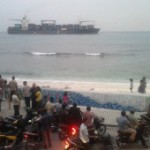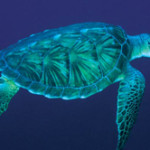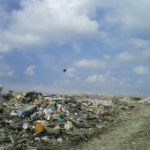The designation of Baa Atoll as a UNESCO World Biosphere Reserve is a significant achievement for the Maldives but makes proper management all the more imperative, government organisations and environmental NGOs have said.
Baa Atoll was last month added to the UN body’s global list of biosphere reserves, placing it in the company of world famous sites such as the Komodo in Indonesia, Uluru (Ayer’s Rock) in Australia and the Galapagos Islands.
The listing recognises “where local communities are actively involved in governance and management, research, education, training and monitoring at the service of both socio-economic development and biodiversity conservation,” UNESCO said in a statement.
It has also prompted a surge of tourism interest in Baa Atoll, requiring local bodies to balance the impact and sustainability objectives of the biosphere with the new income.
Director of the Environmental Protection Authority (EPA) Ibrahim Naeem said it took five years of lobbying for Baa Atoll to become the first globally recognised biosphere in the Maldives.
“The whole atoll has been zoned into three categories, limiting activities conducted there,” he explained.
‘Core areas’ account for 10 percent of the atoll with no extraction activities permitted – “look and see only”, Naeem explained. Buffer areas limit some activities while transitional areas allow most activities if conducted in a sustainable fashion.
Exceptionally unique areas, such as Hanifaru Bay, have a management plan to limit access, Naeem explained: “We allow resorts and safari boats to visit Hanifaru Bay on alternate days to avoid conflicts,” he said, adding that the EPA had appointed a ranger to monitor vessels in the area and was training several more to cover the rest of the atoll.
At the beginning of the process many locals expressed reluctance about the atoll being designated a biosphere, fearing that their traditional fishing areas would be restricted, he acknowledged.
That concern still exists, says Ahmed Ikram, Director of Environmental NGO Bluepeace.
“Local divers and other groups are concerned that these places will become so protected and so exclusive that locals will be unable to access them,” he said. “We have started to hear concerns that these sites will be cordoned off to the public, with access controlled by resorts and limited access for independent dive companies and safaris.”
Local people needed to be trained as rangers, guides and attendants, and NGOs, island womens’ committees and fishermen needed to be involved in decision-making, Ikram said.
“The EPA has handed the management to the Baa Atoll council, but without any capacity building,” he claimed, while resorts sponsored “greenwashing” campaigns to fulfill their corporate social responsibility objectives, protecting their house reefs and excluding local communities.
“The reefs around resorts are some of the most protected in the Maldives. Why are the house reefs of local islands not being protected too?” Ikram asked.
In some cases tourism authorities had failed to take into account traditional bait fishing grounds when leasing islands for resort development.
“If they fall in the vicinity [of the resort] the fishermen will still go there to fish, as they have done so for thousands of years – it would quickly become a national issue if they were stopped,” he said, adding that climate change had also affected many of these areas forcing fishermen to harvest bait elsewhere.
“Already in some areas climate change has meant that fishermen are having to dive 40 metres to get bait,” Ikram said. “We need to remember than man is part of the ecosystem.”
Deputy Environment Minister Mohamed Shareef told Minivan News that the Baa Atoll management scheme would include the creation of revenue mechanism for the community whereby, for example, “one dollar from each dive goes to fund the needs of the local community.”
The management process, he said, was participatory, and for the locals, “absolutely nothing has changed. Local fishing practices and the manner of living is very sustainable, from knowledge generated over many years.”
Baa Atoll is home to 12,000 people distributed across 13 populated islands and six resorts. The atoll is one of the most biodiverse in the Maldives with high concentrations of manta rays, whale sharks and turtles, and a number of species of coral and sea slugs unique to the area.
 (0)Dislikes
(0)Dislikes (0)
(0)





It is a tough job to make Maldivians environmentally friendly people. And also those Muslim fanatics do not denounce this protections stating that it is forbidden in their version of Islam.
maybe Blue peace should start commenting on stuff when they know whats going on ... without any knowledge of whats really going on it becomes very obvious that u did nt do ur home work. dont bluff on these stuff..be more concrete..maybe ali rilwan is too busy at coffees and filling his desk officer job at FM.
Jaisan,
I'm afraid to say that's the hallmark of an uneducated comment.
Your comment sheds no light on what portion of the article you feel the NGO does not 'know what's really going on' about.
You do not enlighten us readers about what really went on, or share with us this additional information/knowledge you appear to possess on this issue.
Finally, you wind up the three line comment with what appears to be an ad-hominem attack on the person, that does nothing to illuminate anybody - and makes your comment even less reputable that the 2 uninsightful sentences preceding it would have made.
Reclaiming lagoon and chopping down of hundred of hectares coastal vegetation Baa Dharvadhoo in the designated of Baa Atoll as a UNESCO World Biosphere Reserve is quite ironic. Besides developing sand banks exclusive for sea bird nesting habitats such as Baa Nelivaru for sunset watching and chasing sea birds away are interesting concepts for the Biosphere Reserve. Making ecosystems services and products exclusively reserve in the name of conservation to certain privilege in the resorts are also interesting feature of the new Reserve.
Reclaiming lagoon and chopping down of hundred of hectares ofcoastal vegetation in Baa Dharvadhoo in the designated of Baa Atoll as a UNESCO World Biosphere Reserve for an aiport is quite ironic . Besides developing sand banks exclusive for sea bird nesting habitats such as Baa Nelivaru for sunset watching and chasing sea birds away are interesting concepts for the Biosphere Reserve. Making ecosystems services and products exclusively reserve in the name of conservation to certain privilege in the resorts are also interesting feature of the new Reserve.
Are YOU believing this ? as what is writen.
“Already in some areas climate change has meant that fishermen are having to dive 40 metres to get bait,” Ikram said. “We need to remember than man is part of the ecosystem.”
I don't think this is climat change ahahah the Humans changed the Fish are just adabted ehehehe.
and where do we see this days any schedule? where we do find
“We allow resorts and safari boats to visit Hanifaru Bay on alternate days to avoid conflicts,” he said, adding that the EPA had appointed a ranger to monitor vessels in the area and was training several more to cover the rest of the atoll.
We do have DiveGuides who has to be re-trained what is enviroment, they are only for money working as a DiveGuide , I do speak foreign and locals guide!
When do you see a guide who is breaking corals with the group going against BIO law, tell the to the Goverment they will take action , but the govermermant mmm sorry wrong, wrong direction just do it yourself as soutercross did, take a knife play with the knife ooooo no problem NO LAW for that, of latest next independent days you will be released. ehehe Happy naturalst and Bio day
Comments from the Blue Peace are ridiculous and as in a previous comment, they should do their homework first.
The AEC project is one of the most successful environmental projects that has been implemented in the Maldives. Community consultations at all levels were conducted for the past 5 years. Opinion surveys were done at all levels.
This is one of the first of such projects where the resort managements and the local community came to a compromise and have agreed to encourage sustainable development and also ensure protection of the rich biodiversity in this area.
I think Blue Peace needs to get out of their sleep mode and be more positive about things and actually help out; if you think the island councils lack capacity and you do, then go there and stay with the community until they learn -- rather than trying to make media savvy comments to promote your undeserving NGO.
It is important to recognize the Governments and local communities efforts to protect these environments and promote sustainability of these ecosystems. I sincerely hope Blue Peace and other NGOs will back the Govt, UNDP, resorts and the local community to make this a success. Success of this project will decide the future of protected areas in this country.
Economic value of biodiversity and intangible services these ecosystems give is recognized and used as a basis of this project. This is the only way we can protect the fragile environments. Economists and Environmentalists need to talk more often, because the greatest threat to environmental protection is conventional economics. Tree-huggers will always criticize everything and anything. But, life must go on....
We have failed managing natural reserves in the past, and we will fail in future too. I wish the EPA good luck not to do the same mistakes again, but Maldives is not really famous for sustainability... same will be with Hanifaru Bay.
yaameen chil chil !!! my comment was not targeted to the readers at large. but to people who are related to conservation and to blue peace who i presume will understand what i was getting at.
I personally know that Ikram would lack the knowledge to comment on these issues from an academic and professional perspective.
It is these kinds of young pretenders and frauds that this government seems to sponsor and bring out to the frontlines.
Such people often feel that this administration provides them with the opportunities that they deserve. However, writing about foreign policy, international politics and conflict resolution with no experience in diplomacy whatsoever is laughable regardless of the gratuitous use of latin phrases and prose learned from reading textbooks.
The hard work of actually making conservation work, begins now, with the declaration. I hope this does not end up being just a good deal for the tourist resorts near by. I hear some resorts are behind manouverings on Hanifaru bay and are already marketing the biosphere reserve status. Lets hope that lack of capacity of the island communities are not used by the resorts to change things so that they get a good buck and the community gets very little. The cost of Baa Atoll conservation work over the last 5 years or more, have come from grants of more than 2 million dollars given to Maldivians. I hope that we get out of this project a lot more.
I feel Ikram has raised some valid points regardless of whether he does not have a degree in environmental science or "academic qualifications". Ikram was speaking on behalf of civil society, on behalf of the oldest environmental NGO in the Maldives, which has contributed to environmental awareness in the country for 21 years. His comments does not necessarily have to be aligned with the views of the policy makers from the government. I do not have the knowledge to comment on whether community opinion and feedback was collected (and to what extent) in the AEC project. However, I agree with Ikram that policy makers often select islands for resort development without taking into consideration possible conflicts with islands communities in the area, especially fishermen. A classic example is Alidhoo in Haa Alifu Atoll, which was selected for developing a tourist resort, despite the lagoon of that island being one of the best locations for collecting bait fish. When this issue was raised the fisheries minister of that time, Hon. Hassan Sabir said that people in neighbouring inhabited islands were banana growers and not fishermen. Indeed, we are witnessing policy makers and so-called educated professionals with academic qualifications failing to protect the environment while it is NGOs such as Bluepeace, and citizens such as Ikram, who are taking bold stands. Bluepeace raised alarms about illegal aquaculture projects in Kendhikulhudhoo and Maalhendhoo (http://www.bluepeacemaldives.org/blog/biodiversity/kendhikulhudhoo-mangroves-under-threat). To this date the environment-friendly government of President Nasheed has done nothing to stop the illegal aquaculture projects. Bluepeace raised its concerns when Dhigulaabadhoo was leased for an aquaculture project. (http://www.bluepeacemaldives.org/blog/biodiversity/cabinet-decides-to-lease-dhigulaabadhoo) Despite EPA's strong opposition to lease Dhigulaabadhoo, the government has proceeded to do so. Bluepeace was quick to protest when the previous government leased Hanifaru for industrial activities (http://www.bluepeacemaldives.org/blog/biodiversity/whale-shark-mating-area-leased-for-industrial-site). The outcry from civil society, concerned individuals such as divers and from international groups forced the government to declare Hanifaru Bay a protected area. I myself have travelled within Baa Atoll and I see very positive partnerships between local communities unfolding there. Some resorts voluntarily transport the garbage from island communities to Thilafushi in boats owned by the resorts. While such efforts must be hailed as fruitful symbiotic endeavours and positive CSR initiatives, the greenwashing practiced by some resorts must not also be forgotten. As one reader Ibrahim has commented here, the use of the sandbank Nelivaru for picnics and sunset watching has chased away all the seabirds which used it as a nesting habitat. Nelivaru was a unique habitat for seabirds till it was monetized by one of the most expensive and supposedly eco-friendly resorts.
I think that the Galapagos Islands are a good example of environmental and conservation efficiency. We have almost 200k visitors a year and the flora and fauna has not been affected.
Ali Rilwan is a strange fellow. I remember him having an exhibition in EPS school with two water snakes in a tank. Anyway Minivan always calls him co-founder of Bluepeace. He can't be because he was too young at that time to be a founder of an NGO. I know he started the whole thing but his name couldn't have been there in the official documents. But I like the work Bluepeace did in 90s. I still have a Save Grouper T-shirt.
nice heading this article has. thanks guys.
Is this article about Rilwan, Ikram or Blue peace ???
As per the conversation held with a fisherman tonight I found out things are worse than before... None of these resorts helps the local community they just squeeze every penny out of our own natural environment in all possible ways
As an advice to JJ please don't encourage personal criticism...
Or is it just your breakthrough idea of increasing your readers?